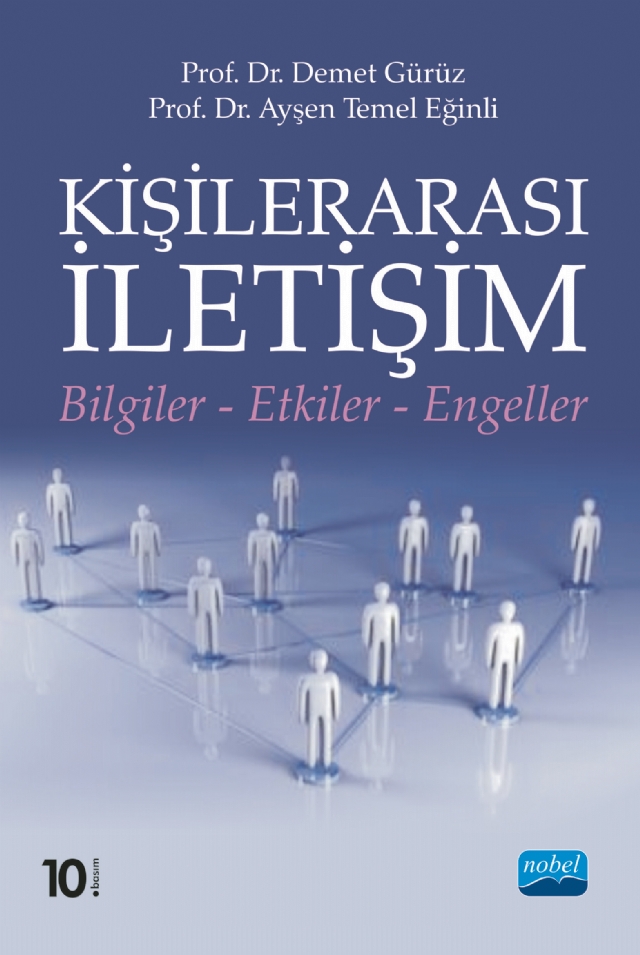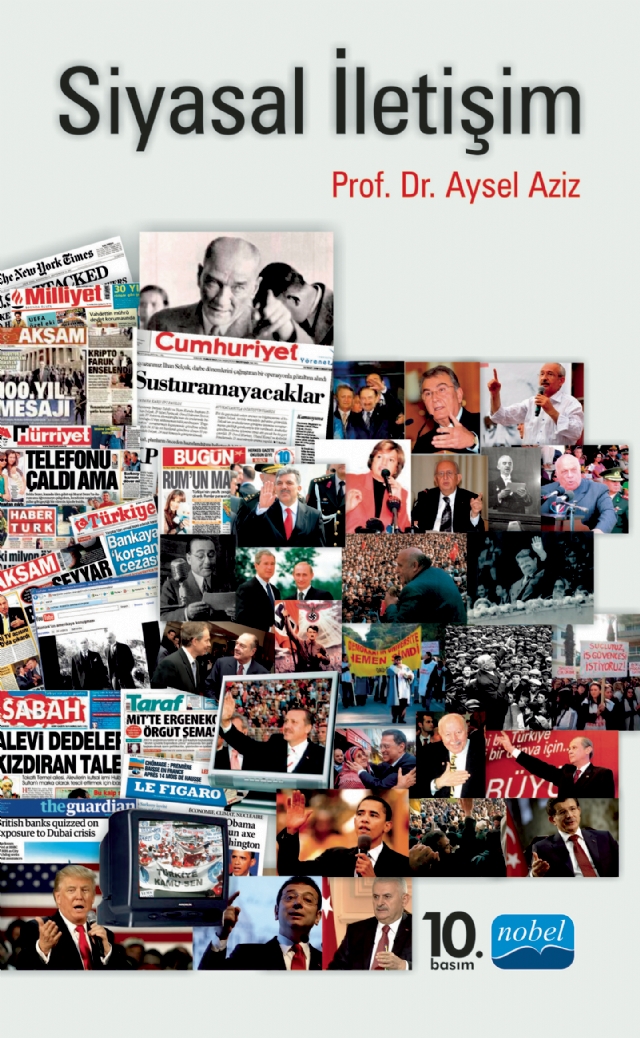Communication Sociology \ 1-1

Communication is something we cannot give up in order to understand, to explain, or to agree… A cycle that we cannot escape from, continuing and responding to what we understand, what we say, and our agreements… An escalator that goes and comes continuously from us to us, from us to you, from you to us, in short from person to person… A cornerstone of life. Contact…
It is a book that guides all individuals in the society these days when we complain about lack of communication and realize that communication is important... While it contributes to learning what communication skills are, it also sheds light on people's ability to see where they make mistakes... It answers the following questions that come to mind:
They don't understand me, I can't explain myself, what should I do?
I think I empathize, or am I not?
There is a constant conflict between us, how can I resolve it?
I'm unsuccessful in group work, why can't I express myself?
I can't convince… How can I do it?
Communication in the family is broken… Why?
My communication with my friends is very bad at my workplace, how can it be improved?
Am I a good listener?
It is a book that guides all individuals in the society these days when we complain about lack of communication and realize that communication is important... While it contributes to learning what communication skills are, it also sheds light on people's ability to see where they make mistakes... It answers the following questions that come to mind:
They don't understand me, I can't explain myself, what should I do?
I think I empathize, or am I not?
There is a constant conflict between us, how can I resolve it?
I'm unsuccessful in group work, why can't I express myself?
I can't convince… How can I do it?
Communication in the family is broken… Why?
My communication with my friends is very bad at my workplace, how can it be improved?
Am I a good listener?

Communication is a long process that started with the existence of human beings in the world, has survived to the present day and will continue in our future.
It is clear that it would be so difficult to explain a subject with such wide borders in the numbered pages of a book! However, by placing certain limitations, important parts of this long adventure were taken and tried to be conveyed to the reader within the framework of the introduction.
Starting from the definition of communication within this kind of limitation, after general information about communication such as its process, relationship with other disciplines, communication types, functions and models, interpersonal communication, mass communication and mass media, news agencies, historical communication and mass communication in Turkey. development, organizational communication, internet and social media. In the last two chapters of the book, the effects of communication on society and communication researches are discussed.
Each of these introductory information; It is researched, analyzed and published under separate headings by other academics, authors and researchers. The aim of this book, titled "Introduction to Communication", is to give general information about such studies as preliminary, and to direct those who want to deepen in their subjects to such studies.
It is clear that it would be so difficult to explain a subject with such wide borders in the numbered pages of a book! However, by placing certain limitations, important parts of this long adventure were taken and tried to be conveyed to the reader within the framework of the introduction.
Starting from the definition of communication within this kind of limitation, after general information about communication such as its process, relationship with other disciplines, communication types, functions and models, interpersonal communication, mass communication and mass media, news agencies, historical communication and mass communication in Turkey. development, organizational communication, internet and social media. In the last two chapters of the book, the effects of communication on society and communication researches are discussed.
Each of these introductory information; It is researched, analyzed and published under separate headings by other academics, authors and researchers. The aim of this book, titled "Introduction to Communication", is to give general information about such studies as preliminary, and to direct those who want to deepen in their subjects to such studies.

Interpersonal communication begins with two people noticing each other and accepting each other's existence. In this process, the person; It conveys messages with its attitudes, personality, behaviors, what it does and does not do, what it says and does not say.
We are in the age of communication… If we are still talking but not explaining, telling but not being understood, talking but not listening, talking but not listening, talking and listening but still not being able to understand… our verbal and nonverbal messages, the factors that affect or hinder our communication should be questioned before our communication ends.
I guess I didn't understand...
You misunderstood me…
I wish I hadn't said that...
Oh my prejudices...
His tone sounded angry…
He made such an emphasis that…
Your eyes didn't say that, but…
He shook hands as if breaking my fingers…
What a stance it was, it told a lot…
Interpersonal Communication -Information-Impacts-Obstacles- evaluates various aspects of the interpersonal communication process with examples. In this sense, the book will shed light on both researchers who continue their academic studies and anyone who wants to communicate effectively.
We are in the age of communication… If we are still talking but not explaining, telling but not being understood, talking but not listening, talking but not listening, talking and listening but still not being able to understand… our verbal and nonverbal messages, the factors that affect or hinder our communication should be questioned before our communication ends.
I guess I didn't understand...
You misunderstood me…
I wish I hadn't said that...
Oh my prejudices...
His tone sounded angry…
He made such an emphasis that…
Your eyes didn't say that, but…
He shook hands as if breaking my fingers…
What a stance it was, it told a lot…
Interpersonal Communication -Information-Impacts-Obstacles- evaluates various aspects of the interpersonal communication process with examples. In this sense, the book will shed light on both researchers who continue their academic studies and anyone who wants to communicate effectively.

Political Communication has been constantly revised, expanded and updated since its first publication in 2003. In this edition of the book, the changes and updates made in the 8th edition, both in form and content, have been preserved.
In the book, the phenomenon and process of communication are explained on the basis of the phenomenon of communication, but taking into account the characteristics of political discourse. With its broad definition, all political communication actors, features, genres, methods and techniques in political discourse, and the relationship between media and political communication, which has a unique place in political communication; constitutes the facts on which the book particularly focuses.
The book gives a special place to the communication of political parties, one of the actors of political communication, and focuses mainly on the political campaigns of political parties, both in wide and narrow time periods, and especially on election campaigns; It explains the political campaigns of the very recent history by giving examples from Turkish political life.
In the last part of the book, a general evaluation is made by referring to the researches made in the world and in Turkey regarding political communication.
In the book, the phenomenon and process of communication are explained on the basis of the phenomenon of communication, but taking into account the characteristics of political discourse. With its broad definition, all political communication actors, features, genres, methods and techniques in political discourse, and the relationship between media and political communication, which has a unique place in political communication; constitutes the facts on which the book particularly focuses.
The book gives a special place to the communication of political parties, one of the actors of political communication, and focuses mainly on the political campaigns of political parties, both in wide and narrow time periods, and especially on election campaigns; It explains the political campaigns of the very recent history by giving examples from Turkish political life.
In the last part of the book, a general evaluation is made by referring to the researches made in the world and in Turkey regarding political communication.

It is estimated that nearly half of the world's population, which is approaching 8 billion, uses social media. The current stop of the journey of using communication technologies, which started with the telegraph, is seen as social media. In an increasingly digitalizing world, social media undoubtedly affects people in every aspect of their lives. Consumer, customer, parent, business person, lover, voter… Regardless of identity, people are more or less in contact with social media, they affect someone more or less on social media, and they are also more or less influenced by others on social media.
This book presents a selection of theoretical and empirical studies on the role of social media in human and mass psychology.
This book presents a selection of theoretical and empirical studies on the role of social media in human and mass psychology.

Communication is a process that exists with the society, develops and changes with the society; shaped in parallel with social changes. Social media is a social communication process and a virtualized form of socialization. Communication, which takes place in our lives in every form and form that progresses from face-to-face communication to virtual communication today, is at the center of our lives, especially with the form of social media that we have started to use intensively with the COVID-19 pandemic. In today's world, when we are confined to our homes due to the pandemic, and live all our socialization activities and all processes of life in digital form, almost all subjects related to human and society have become virtualized versions of our lives in the physical world, by becoming virtualized and massified with the effect of social media. This book, which aims to provide answers about social media, which has become a virtual society, consists of topics that form social life, about the society, and also determines our virtual lives and agendas by moving to social media, and offers different perspectives on the sociology of social media.